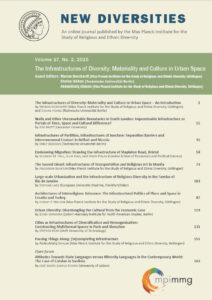Architectures of Interreligious Tolerance: The Infrastructural Politics of Place and Space in Croatia and Turkey
by Jeremy F. Walton (Max Planck Institute for the Study of Religious and Ethnic Diversity, Göttingen)
To cite this article: Walton, J. F. (2015). Architectures of Interreligious Tolerance: The Infrastructural Politics of Place and Space in Croatia and Turkey. New Diversities, 17(2), 103–117. https://doi.org/10.58002/c9tt-ry44
Drawing on research conducted at a mosque in the Croatian port city of Rijeka and an integrated space of worship (a “mosque-cem house”) for Sunni and Alevi Muslims in the Turkish capital of Ankara, this essay traces the divergences between discursive practices and spatial practices in relation to infrastructures of religious diversity. After developing a theoretical model based on Michel de Certeau’s distinction between place and space, I examine the shared discourse of interreligious tolerance and pluralism that framed both Rijeka’s New Mosque and Ankara’s mosque-cem house. Following this, I analyze the radically different spatial practices choreographed by the two projects: the spatial “mixing” of distinct religious communities and forms of worship in the case of the mosque-cem house, and the spatial separation and sequestration of Islam in relation to the city and nation at large in the case of the New Mosque. I argue that the contrast between the politicization of the mosque-cem house project and the near-unanimous approbation for the New Mosque stems from this contrast in spatial practices. The essay concludes with a vignette from the neighborhood near the mosque-cem house that draws attention to the potential contradictions between infrastructures of diversity and more protean forms of social, cultural, and religious plurality.
Keywords: politics of tolerance, spatial practices, Muslim minorities, Islam, Croatia, Turkey
|
